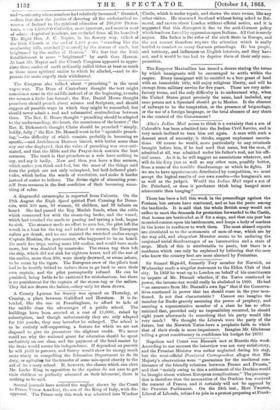The Congress also talked about " preaching " in the
usual vague way. The Dean of Canterbury thought the text might sometimes come in the middle instead of at the beginning, to make the sermon a little less formal ; the Rev. Daniel Moore thought preachers should preach about science and Scripture, and should suggest all possible ways in which they might be reconciled, but should never admit a real and substantial contradiction between them. The Rev. E. Hoare thought "preaching should be adapted to the understanding, the heart, the conscience of the hearer ;" the Rev. E. Bickersteth thought Christ should be preached "simply, boldly, fully ;" the Rev. Dr. Monsen went in for "apostolic preach- ing,"—the difficulty of which consists probably in becoming an apostle,—and Archdeacon Denison hinted, with better sense than any one else displayed, that the value of preaching was over-esti- mated, and that the Bible and the Prayer-book contain the best sermons. The truth is that preachers as a rule have nothing to say, and say it badly. Now and then you have a fine sermon, which makes you think and feel, but the mass of the things said from the pulpit are not only uninspired, but half-believed plati- tudes, which bedim the words of revelation, and make it harder instead of easier to believe. The divine right of absenting your- self from sermons is the first condition of their becoming some- thing of value.






























 Previous page
Previous page